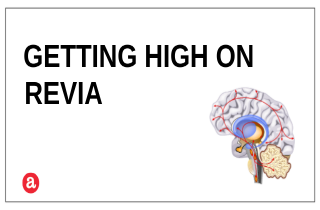No, Revia does not get you high.
Revia is a medication used to prevent people from using opiates or from drinking. While Revia affects the brain, it does not cause euphoria or an extreme feeling of well-being. In fact, it works to block the pleasurable affects of drinking or taking drugs like heroin, hydrocodone, or morphine.
More information here on Revia, how it works in the brain and body, and how it’s used as a part of addiction treatment. Then, we welcome your questions and comments in the section at the bottom of the page.
Revia use and chemistry: What’s in Revia?
Revia comes as tablets intended for oral consumption only and is prescribed in the treatment of alcohol dependence and opioid drug dependence. Revia is supplied in scored film-coated tablets containing 50 mg of naltrexone hydrochloride. More specifically, Revia contains naltrexone (naltrexone hydrochloride), its main active ingredient. Revia also contains other ingredients, including: colloidal silicon dioxide, crospovidone, hydroxypropyl methylcellulose, lactose monohydrate, magnesium stearate, microcrystalline cellulose, polyethylene glycol and other. How long does Revia stay in the body? A single dose may have therapeutic effect for up to 24 hours after dosing, although the half life for naltrexone and naltrexol are around 4 and 13 hours, respectively.
How does Revia work in the brain?
1. Revia in the brains of alcoholics.
The intake of alcohol stimulates the release of certain neurotransmitters in the brain, such as dopamine, serotonin, and opioid peptides. The release of these neurotransmitters produces pleasurable and rewarding feelings in the brain. That’s why alcohol makes you feel good when you drink. When Revia is prescribed, it helps alcoholics in recovery deal with cravings and decreases the desire to drink alcohol. By blocking the brain’s chemical responses that make alcohol rewarding, Revia can help patients avoid drinking and stay sober.
2. Revia in the brains of opioid-dependent individuals.
The active ingredient in Revia is naltrexone, which is an opiate antagonist. This means that it blocks the effects of opiate drugs, which may be natural like heroin, morphine and codeine or synthetic like methadone, tramadol, fentanyl, etc. Revia also blocks the euphoria or “high” that people get from opiates, but has little to no effect on opioid cravings. It works by blocking the opioid receptors in the brain, so users won’t get any pain relief or feelings of well-being from their drug of choice.
Revia central nervous system effects
Revia, as a pure opioid antagonist medication tends to bind to opioid receptor sites in the brain. However, Revia has no addictive liability and does not trigger euphoric effect. Specifically, the naltrexone found in Revia binds mostly at the µ-opioid receptor, but also binds at the k-opioid receptor and the d-opioid receptor. By binding to these particular receptors, Revia has the properties to reduce or completely block the subjective effects produced by alcohol and opioid drugs.
Revia blocks the effects of opioids by competitive binding at the opioid receptors, and the mechanism is well know to scientists. However, it is not yet fully understood how Revia works for alcoholism, but clinical studies suggest there is a possible involvement of the endogenous opioid system.
Mixing Revia with other substances
Revia treatment should not be initiated in patients who are currently dependent on an opioid narcotic or who are experiencing withdrawal symptoms. So, mixing Revia with narcotic pain medicines or opioid medicines used to treat opioid addictions should be avoided.
Revia may also change the way other medicines work and increase the risk of adverse and unwanted reactions. Here is a list of medications that Revia can interact with (note that this is not a complete list):
- blood thinners
- cough medicines
- diarrhea medications
- disulfiram (Antabuse)
- narcotics or opioid analgesics (codeine, hydrocodone, tramadol, meptazinol, morphine, buprenorphine, dipipanone, diamorphine, methadone, oxycodone, pentazocine, pethidine)
When prescribing Revia to patients, doctors are obligated to inform them about all possible drug interactions and side effects. Patients, on the other hand, should report all other prescription or illicit drugs they are using as well as negative side effects if/when they occur.
Revia for alcohol and opioid dependence
When initiating Revia, you should know that it is not a medication that will miraculously cure addiction. Your addiction recovery can be made more manageable with medications such as Revia, but a full recovery plan will incorporate the help of medical and addiction professionals, as well psychotherapy.
Doctors don’t recommend Revia if:
- You have a history of allergic reactions to naltrexone or to any of the ingredients included in the recipe for Revia.
- You are still taking opioid drugs, opioid-based prescription medications, or if you are taking certain painkillers. Taking Revia while on any of these opioid drugs you will make you experience extremely uncomfortable withdrawal symptoms.
- You just quit opioid drugs or alcohol use. Revia is not recommended while you are in the early stages of withdrawal, as the substances and their metabolites have not left your organism yet.
- You have been diagnosed with hepatitis, serious liver damage, liver failure or kidney disease. Revia is definitely not recommended to patients with hepatic and kidney problems since it can seriously worsen the condition.
- You are pregnant or you are planning to become pregnant. Also, tell your doctor if you are breastfeeding your infant or planning on breastfeeding while using Revia.
Questions about Revia
Revia has already helped many in their path towards recovery and in building a substance-free life. We advise you to contact a medical or addiction professional if you are interested in Revia. You can also post any questions or uncertainties in the comments section below and we’ll try to provide a personal and prompt response to all legitimate inquiries.









Related Posts